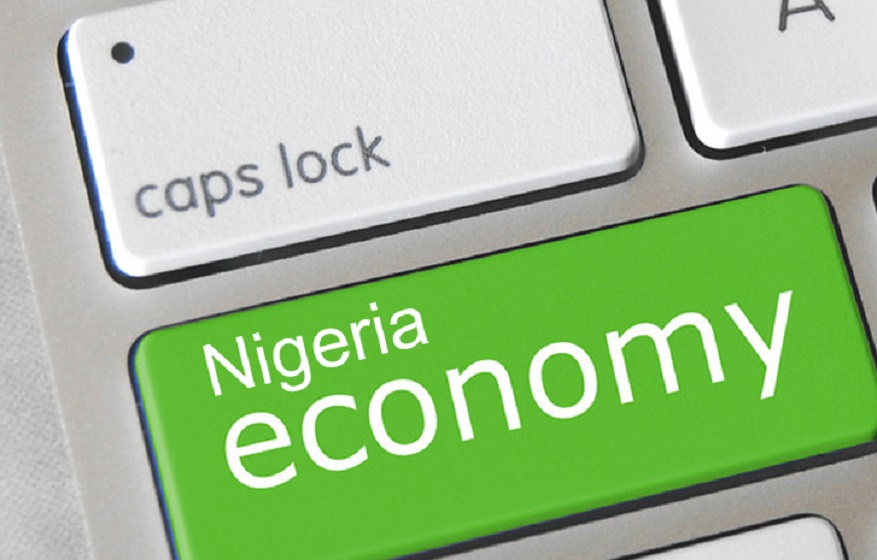Economy
Supporting SMEs Can Get Nigeria Out Of Recession—Nmonwu

By Ebitonye Akpodigha
Regional Director for Sage West Africa, Mr Magnus Nmonwu, has suggested that providing support for small businesses in Nigeria could be one of the key ingredients to carrying the country through these tough times.
He pointed out that this should become a priority for big businesses and the Federal Government.
“Nigerian entrepreneurs and business owners are the engines that drive the country’s economy,” says Mr Nmonwu.
He added that, “During recessions, big companies are able to adjust by downsizing and cutting costs. Small businesses, however, keep going and carry the losses. They need our support, as they can contribute to turning the economy around, far more quickly.
“It is important that government and other stakeholders listen to entrepreneurs’ concerns as they seek to grow and contribute to the economy.
“We have embraced the responsibility of helping to amplify the voice of small business, because we also started small and understand the challenges entrepreneurs of small face in such times.”
He also said with the recession biting, small and medium businesses face the reality that consumers won’t have as much money to spend and that investors and business partners will taper down investment.
Given that Nigeria has an estimated 37 million micro, small, and medium-size enterprises making a significant contribution to GDP and employment, this sector should be treated as an economic priority.
Another concern on the horizon is the looming Communication Service Tax Bill 2015, which is currently with the National Assembly. If passed into law, the law will require that consumers of voice, data, SMS, MMS and pay TV services pay a 9% tax on their tariffs for using these services.
This is in addition to other taxes people already pay for mobile and Internet access – 5% VAT, 12% import duties on ICT devices, and 20% tax levied on SIM cards, amongst the series of taxes. The Alliance for Affordable Internet, Nigeria Coalition, estimates that the tax could prevent more than 50 million Nigerians from affording a basic broadband connection.
“Nigerian entrepreneurs depend on their mobile phones and the Internet to run their businesses,” says Mr Nmonwu. “The tax could potentially raise the cost of doing business and hold back Nigeria’s integration into the global digital economy by excluding people from broadband access.”
Mr Nmonwu says that it is understandable that the government needs to raise new tax revenues in the wake of falling commodity prices. However, this should ideally be done in a way that nurtures the growth of the Small & Medium Business, technology and services sectors – especially at a time Nigeria needs to diversify its economy beyond oil
Emphasis should be placed on creating new tax revenues. For example, a conditional tax amnesty could encourage smaller businesses who have not compiled with tax laws to fall into the tax net. By making short-term sacrifice of potential tax revenues, government could bring more businesses into the formal economy and help them grow into enterprises able to employ more people, approach banks for financing and pay taxes.
Financing small businesses
“In this regard, we are encouraged to see some of the moves that government, multilateral financing institutions and other stakeholders are making to support entrepreneurs,” Mr Nmonwu adds. In particular, he welcomes the Central Bank’s launch in May 2016 of a modern online collateral registry, supported by the World Bank. The registry will enable low-income earners and micro-entrepreneurs to secure loans against movable assets such as machinery, livestock, and inventory.
Other bodies providing small businesses with financial support include:
Bank of Industry, which supports new or existing companies, seeking expansion, modernization or diversification;
The National Economic Reconstruction Fund (NERFUND), which provides medium-to-long-term financing for viable small and medium enterprise; and
Bank of Agriculture (BoA), which provides financial support for all agricultural in addition to rural micro enterprises.
“Funding is one of the major challenges entrepreneurs face in Nigeria, so these are great initiatives,” Mr Nmonwu says. “We would welcome similarly innovative interventions to address some of the other challenges small businesses face such as complex tax and remove regulations and general business red-tape.”
The Nigerian government is also to be commended for establishing a range of organisations and initiatives to support Small & Medium Businesses. For example, the Small and Medium Enterprise Development Agency of Nigeria (SMEDAN) identifies Nigerians who are interested in entrepreneurship and provides them with training in entrepreneurship and vocational skills. Entrepreneurs meet regularly to share ideas about growing their businesses under the umbrella of SMEDAN.
He further said, “Entrepreneurs make life-sacrifices. They are dreamers and innovators. They take risks to pursue their passions and, on this, Nigeria’s prosperity can or should be built /developed. They deserve a bigger voice and we will always work hard to champion this noble cause.”
Economy
NGX RegCo Cautions Investors on Recent Price Movements

By Aduragbemi Omiyale
The investing public has been advised to exercise due diligence before trading stocks on the Nigerian Exchange (NGX) Limited.
This caution was given by the NGX Regulation Limited (NGX RegCo), the independent regulatory arm of the NGX Group Plc.
The advisory became necessary in response to notable price movements observed in the shares of certain listed companies over recent trading sessions.
On Monday, the bourse suspended trading in the shares of newly-listed Zichis Agro-allied Industries Plc. The company’s stocks gained almost 900 per cent within a month of its listing on Customs Street.
In a statement today, NGX RegCo urged investors to avoid speculative trading based on unverified information and to consult licensed intermediaries such as stockbrokers or investment advisers when needed.
It explained that its advisory is part of its standard market surveillance functions, as it serves as a measured reminder for investors to prioritise informed and disciplined decision-making.
The notice emphasised that the Exchange will continue to monitor market activities closely in line with its mandate to ensure a fair, orderly, and transparent market.
“NGX RegCo encourages all investors to base their decisions on publicly available information, including a thorough assessment of company fundamentals, financial performance, and risk profile,” a part of the disclosure said.
It reassured all stakeholders that the NGX remains stable, well-regulated, and resilient, saying the platform continues to foster an environment where investors can participate with confidence, supported by robust oversight and transparent market operations.
“Our primary responsibility is to maintain a level playing field where market participants can trade with confidence, backed by timely and accurate information.
“This advisory is a routine communication, reinforcing that sound fundamentals, not speculation, remain the foundation for sustainable investment outcomes. We are fully committed to preserving the integrity and stability of our market,” the chief executive of NGX RegCo, Mr Olufemi Shobanjo, stated.
Economy
Stronger Taxpayer Confidence, Others Should Determine Tax Reform Success—Tegbe

By Modupe Gbadeyanka
The chairman of the National Tax Policy Implementation Committee (NTPIC), Mr Joseph Tegbe, has tasked the Nigeria Revenue Service (NRS) to measure the success of the new tax laws by higher voluntary compliance rates, lower administrative costs, fewer disputes, faster resolution cycles, and stronger taxpayer confidence.
Speaking at the 2026 Leadership Retreat of the agency, Mr Tegbe said, “Sustainable revenue performance is built on trust and efficiency, not enforcement intensity,” emphasising that the legitimacy and predictability of the system are more critical than punitive measures.
He underscored that the country’s tax reform journey is at a critical juncture where effective implementation will determine long-term fiscal outcomes.
The NTPIC chief stressed that tax policy must serve as an enabler of governance, and should embody simplicity, equity, predictability, and administrability at scale.
These principles, he explained, foster voluntary compliance, reduce operational friction, and strengthen investor confidence. He warned that ad-hoc adjustments or policy drift could undermine reform momentum, unsettle businesses, and deter investment, which thrives on predictable rules rather than shifting announcements. Structured sequencing, clear transition mechanisms, and continuous feedback between policymakers and administrators are therefore critical to sustaining reform credibility.
Mr Tegbe further argued that revenue reform cannot succeed in isolation. Achieving sustainable gains requires a whole-of-government approach, leveraging robust taxpayer identification systems, integrated financial data, efficient dispute resolution, and harmonised coordination across federal and sub-national levels. This approach, he said, reduces leakages, eliminates multiple taxation, and reinforces confidence in the system.
He noted that the passage of four new tax laws marks only the beginning of a broader reform agenda, describing the initiative as a systemic recalibration of Nigeria’s fiscal architecture, rather than a routine policy update.
He further asserted that the true measure of success will be the credibility of implementation, not the design of the laws themselves.
The NRS, he noted, functions as the nation’s “Revenue System Integrator,” with outcomes reflecting the strength of an interconnected ecosystem that encompasses policy clarity, enforcement consistency, digital infrastructure, dispute resolution efficiency, and intergovernmental coordination.
Economy
NUPENG Seeks Clarity on New Oil, Gas Executive Order

By Adedapo Adesanya
The National Union of Natural and Gas Workers (NUPENG) has expressed deep concern over the Executive Order by President Bola Tinubu mandating the Nigerian National Petroleum Company (NNPC) Limited to remit directly to the federation account.
In a statement signed by its president, Mr William Akporeha, over the weekend in Lagos, the union noted that the absence of detailed public engagement had naturally generated tension within the sector and heightened restiveness among workers, who are anxious to know how the new directive may affect their employment, welfare and job security, especially as it affects NNPC and other major operations in the oil and gas sector.
It pointed out that the industry remained the backbone of Nigeria’s economy, contributing significantly to national revenue, foreign exchange earnings, and employment.
The NUPENG president affirmed that any policy shift, particularly one introduced through an Executive Order, has far-reaching consequences for regulatory frameworks, Investment decisions, operational standards, and labour relations within the sector.
According to him, “there is an urgent need for clarity on the scope and objectives of the Executive Order -What precise reforms or adjustments does it introduce? “Its implications for the Petroleum Industry Act -Does the Order amend, interpret, or expand existing provisions under PIA?
“Impact on workers and existing labour agreements-Will it affect job security, conditions of service, Collective Bargaining agreements or ongoing restructuring processes within the industry? “Effects on indigenous participation and local content development -How will it affect Nigerian companies and employment opportunities for citizens?”
He warned that without proper consultation and explanation, misinterpretations of the Executive Order may spread across the industry, potentially destabilising operations and undermining industrial harmony that stakeholders have worked hard to sustain.
“Though our union remains committed to constructive engagement, national development and stability of the oil and gas sector, however, we are duty-bound and constitutionally bound to protect the rights and welfare and job security of our members whose livelihoods depend on a clear, fair and predictable policy framework,” Mr Akporeha further stated.
-

 Feature/OPED6 years ago
Feature/OPED6 years agoDavos was Different this year
-
Travel/Tourism10 years ago
Lagos Seals Western Lodge Hotel In Ikorodu
-

 Showbiz3 years ago
Showbiz3 years agoEstranged Lover Releases Videos of Empress Njamah Bathing
-

 Banking8 years ago
Banking8 years agoSort Codes of GTBank Branches in Nigeria
-

 Economy3 years ago
Economy3 years agoSubsidy Removal: CNG at N130 Per Litre Cheaper Than Petrol—IPMAN
-

 Banking3 years ago
Banking3 years agoSort Codes of UBA Branches in Nigeria
-

 Banking3 years ago
Banking3 years agoFirst Bank Announces Planned Downtime
-

 Sports3 years ago
Sports3 years agoHighest Paid Nigerian Footballer – How Much Do Nigerian Footballers Earn























